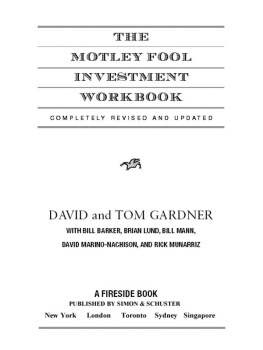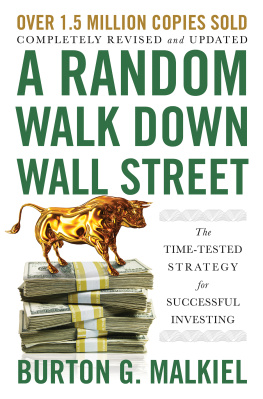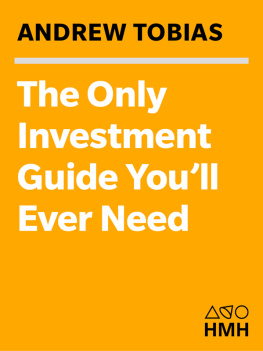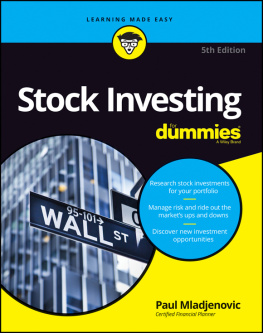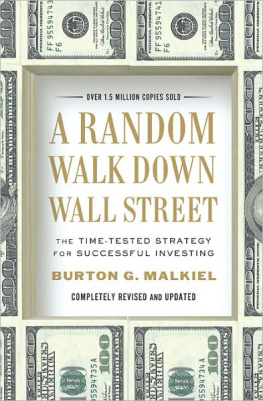Thank you for downloading this Simon & Schuster ebook.
Get a FREE ebook when you join our mailing list. Plus, get updates on new releases, deals, recommended reads, and more from Simon & Schuster. Click below to sign up and see terms and conditions.
CLICK HERE TO SIGN UP
Already a subscriber? Provide your email again so we can register this ebook and send you more of what you like to read. You will continue to receive exclusive offers in your inbox.
CONTENTS

PART I
WHO, WHAT, WHY, AND HOW

1
FOOL?
Take heed... The wise may be instructed by a fool... You know how by the advice and counsel and prediction of fools, many kings, princes, states, and commonwealths have been preserved, several battles gained, and divers doubts of a most perplexed intricacy resolved.
Rabelais
The world has changed dramatically since The Motley Fool began its quest to help the world invest better in 1993. Todays individual investor is armed with more information and greaterand cheaper!access to the markets than ever before. Today, we can find a stock idea, research it online, and buy shares, all in a matter of mere moments... not that we think you should.
But much remains the same. Investing in individual equities remains the truest path to lasting wealth. Many Wall Street brokers will argue to their last breath that you cant do it on your own. But we have clear evidencenow with a track record that spans more than twenty yearsthat individual investors can beat the market... so long as they can overcome a few key behavioral barriers.
And yes, were still answering questions about the name we chose for our company. So lets start there.
Fool?
Thats certainly not a very wise choice for a name when youre trying to ply your trade in the investment world. For decades, financial professionals have done their best to sell customers on their Wisdom. Whether its the pinstripe suit, the knowing smile, or the self-satisfied advertising slogan (one company referred to itself as Rock Solid, Market Wise), your typical broker, money manager, or financial planner has striven for an image of success, intelligence, experience, respectabilityin a word, Wisdom.
And for decades, theyve been making a fair amount of money off of fools. You know about fools. You might even have been one yourself at some point. Ever bought a stock on your dentists recommendation with only a vague understanding of the companys business model? Or have you plunked down your money for shares of an under-the-radar business because an email in your inbox breathlessly proclaimed it a cant miss opportunity... bound to double from $0.04 to $0.08 because of CANT-MISS catalysts? How very foolish of you. Or what about the time you snapped up shares of the International Dashed Hopes Load Fund just because your broker said it was the top performer in its category last year? Terribly, terribly foolish.
And the financial establishment thanks you.
Fortunately, you dont need to be the one who provides the funds for other peoples dreams. Its possiblenow more than everto make informed, intelligent decisions that will help you make the most of your financial future.
The Wall Street Wise would have you believe that A Fool and his money are soon partedwe get that a lot. But in a world where more than eight out of every ten mutual fund managers lose to the market averages, year in and year out, how Wise should you aspire to be? In what other realms could such a paradox exist: that the paid professional can do no better thanin fact, cannot even do as well asdumb luck?
And yet, in few other arenas are the trappings of the profession so enmeshed with the job itselfmassive desks, expensive suits, gold cufflinks, precision watches. You be the judge of whether those accoutrements are designed to impress, intimidate, or overcompensate for their underperformance.
And that got us to thinking, working out of a far-from-glamorous 12-by-8-foot backyard shed all those years ago, that we should just go ahead and call ourselves Fools, since our attitude and approach to life were so radically different from what was being passed off as Wisdom all around us.
So we launched the very earliest iteration of The Motley Fool, taking the name from (an admittedly nondescript quotation from) Shakespeares As You Like It: A fool, a fool! I met a fool i the forest, a motley fool.
Wed always loved Shakespeares Fools: they amused as they instructed and were the only members of society who could tell the truth to the king or queen without having their heads lopped off. The Motley Fool began as a monthly newsletter distributed to a very... lets call it exclusive membership base. The printed newsletter soon transformed into a daily feature in the early days of America Online, when users paid by the minute they spent in our community. From those humble beginnings, the Fool has become one of the premier financial destinations online, with millions of investors reading our free analysis and advice, conversing in our community, participating in our stock-picking game, and performing their research in pursuit of winning stocks. The Fool now offers a suite of premium services catered to different investing styles, mutual funds that follow our Foolish tenets, and even a wealth-management business for those who love our style and advice but want to leave the heavy lifting to someone else. And The Motley Fool continues to seek new avenues to achieve its mission: to help the world invest... better.
Our goal was and is very simple: beat the market and show others how to do itwhether thats a teenager deciding how to invest the proceeds from her summer lawn-mowing business or a savvy, seasoned investor who wants to profit from advanced options trades. In our decades pursuing this goal, weve enabled millions of people to invest their own moneywithout the help of Armani suitsand set a course to the financial future they seek.
Our approach is best characterized by our general disinterest in, and mild disdain for, conventional wisdom. For example, the Wise will encourage you to invest your money in loaded mutual funds. (This double dip enables them to charge you for that advice and then charge you on an annual basis for the funds management fees.) We, on the other hand, are telling you to buy stocks. They might tell you, All right, take on that risk of stocks, but only buy the very safest ones. Or, alternatively, some brokers will try to sell you a collection of rinky-dink shares of penny stocks, dubious entities with an even more dubious likelihood of ever paying off. And many brokers, once youve entrusted them with your savings, will quietly rotate you into and out of investment vehicles, maximizing their transaction fees... but not your profits.
We want you to buy shares of great companies, sprinkle some more volatile growth stocks in with an array of blue chips, and skip the penny stocks altogether. Then hold those stocks for the long haulthink decades, not days. We espouse this approach for one simple reason: it works. Going back through history, youll see that the stock market is pretty close to a sure thing, if you have the proper timeline (no day trading!) and temperament (no panicking!). From 1871 through 2012, holding periods of a single day were essentially a coin flip52 percent of those days earned positive returns. But investors with longer horizons fared much, much better. Eighty-eight percent of ten-year holding periods were positive, and (this is not a typo) 100 percent of twenty-year and thirty-year holding periods made money. In pretty much any comparison between stocks and other asset classes, stocks win. According to a Credit Suisse study of the twenty-eight markets it tracks, stocks outperformed bonds, which outperformed cash in twenty-seven of them... by a wide margin. (Chinas the only exception, and thats because the country literally burned capitalistic symbols to the ground under Mao Zedong.) In short, stocks beat all other asset classes around the globe.


